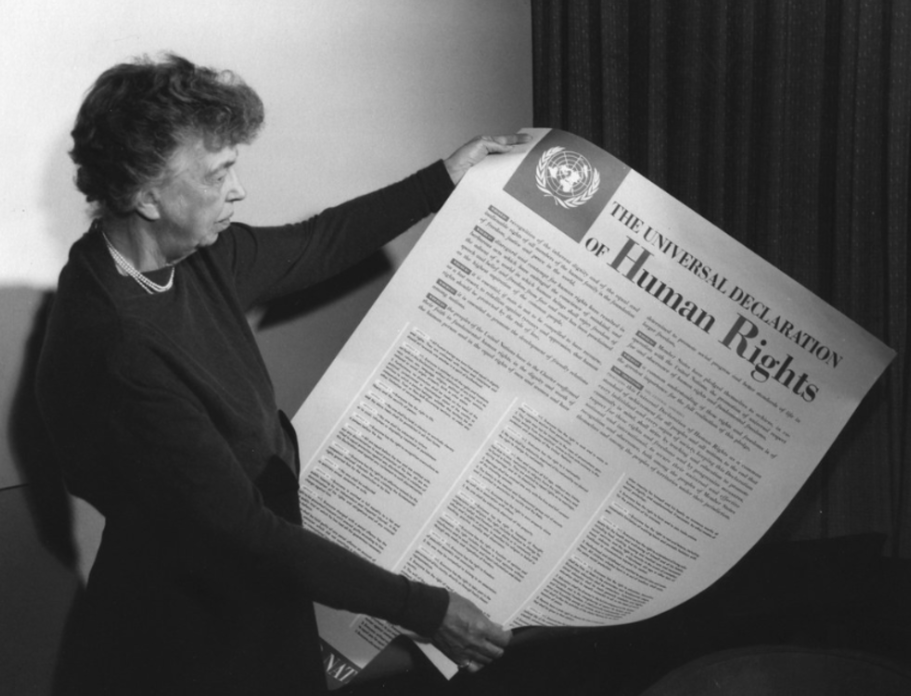
Roosevelt works tirelessly for human rights
Reading time: 2-3 minutes.
In 1946, Eleanor Roosevelt (1884-1962), widow of former President Franklin D. Roosevelt (1882-1845), was appointed by his successor, President Harry Truman (1884-1972), to represent the United States at the newly created United Nations. She soon took charge of the Commission on Human Rights, where she played a crucial role in drafting the Universal Declaration of Human Rights (UDHR). With her visionary approach, Roosevelt led the process of shaping this historic declaration. When she presented the UDHR to the United Nations General Assembly in 1948, she spoke with conviction, “Today we stand on the eve of an event of priceless value, both for the United Nations and for humanity. This declaration can become the international Magna Carta for all people, no matter where they are.” Her words were a plea for a new era of universal rights and freedoms that would shape the foundations of modern international law.
A philosophical tea party at Roosevelt
In the early days of the Commission on Human Rights, Roosevelt hosted a meeting in her Washington Square apartment. She invited three key figures for tea: Chinese delegate Peng Chun Chang, Lebanese diplomat and philosopher Charles Malik, and French jurist and diplomat René Cassin. Dr. Chang, an ardent supporter of pluralism, introduced the rich wisdoms of Chinese philosophy, while Malik based his views on the profound teachings of Thomas Aquinas. René Cassin, in turn, brought in a legal and humanitarian approach inspired by his own experiences and the French legal tradition. Amid this lofty discussion, Roosevelt, with her intuition and subtle diplomacy, guided the conversation toward the course she envisioned. The intellectual exchanges greatly enriched the process, bringing together diverse cultural and philosophical traditions, laying the foundation for what would become the Universal Declaration of Human Rights.
“Do that which you feel in your heart is right – because you will be criticized either way. You will be cursed if you do it but you will also be cursed if you don’t do it .” – Eleanor Roosevelt.
“First Lady of the World”
Eventually, President Truman gave Roosevelt the nickname “First Lady of the World,” a title that honored her tireless commitment to human rights. Until her death, she remained committed to the worldwide recognition and observance of the rights enshrined in the Universal Declaration of Human Rights. The principles she helped formulate are enshrined in the constitutions of numerous countries and form the cornerstones of international law. This law, which is constantly evolving, now offers protection to every individual around the world and remains a living testimony to Roosevelt’s vision of universal dignity and justice.
Read more
- The Universal Declaration of Human Rights (UDHR) via the Amnesty website. Accessed 15/9/2024.
- Learn more about human rights on the website of UNESCO. Accessed 22/9/2024.
- Web page on members of the Commission on Human Rights. Accessed 22/9/2024.
Photo: Eleanor Roosevelt holds a poster of the UDHR. 1949. Source: Wikipedia.com.
Alle auteurs
- Olivier Lichtenberg
- ADHD
- Advice from the doctor
- African poetry
- AIDS activism and gay emancipation
- Bibliography of Chris
- Bibliography of Olivier
- Biography of Chris
- Biography of Olivier
- Biography of Patrick
- Blogs
- Chris' Stage
- Columns
- Covid
- Dirk van Babylon Newsletter
- Double calling
- Essays
- Fragile light
- Hanna's Mind Wanderings
- Incapacity for work
- Late Pasquino's
- LEIF doctor
- Liechtensteiner
- Medical newsletter
- Memoirs of a general practitioner
- Miguel Molinos
- Moctines
- Musings
- Myriad
- Practice in Erembodegem
- Resignation
- Sleep problems
- Sonnets
- Sprawl Month
- Substance abuse and addiction
- Travel
- Uncategorized
- Vi to
- Vögels
- Voluntary euthanasia
- Weltschmerz
- Wormwood or The dose makes the poison
- Patrick Bernauw
- ADHD
- Advice from the doctor
- African poetry
- AIDS activism and gay emancipation
- Bibliography of Chris
- Bibliography of Olivier
- Biography of Chris
- Biography of Olivier
- Biography of Patrick
- Blogs
- Chris' Stage
- Columns
- Covid
- Dirk van Babylon Newsletter
- Double calling
- Essays
- Fragile light
- Hanna's Mind Wanderings
- Incapacity for work
- Late Pasquino's
- LEIF doctor
- Liechtensteiner
- Medical newsletter
- Memoirs of a general practitioner
- Miguel Molinos
- Moctines
- Musings
- Myriad
- Practice in Erembodegem
- Resignation
- Sleep problems
- Sonnets
- Sprawl Month
- Substance abuse and addiction
- Travel
- Uncategorized
- Vi to
- Vögels
- Voluntary euthanasia
- Weltschmerz
- Wormwood or The dose makes the poison
Other works by our writers
- November 2025 (1)
- August 2025 (1)
- July 2025 (2)
- March 2025 (3)
- December 2024 (10)
- November 2024 (6)
- October 2024 (3)
- February 2021 (3)
- January 2021 (5)
No comments have been posted yet!